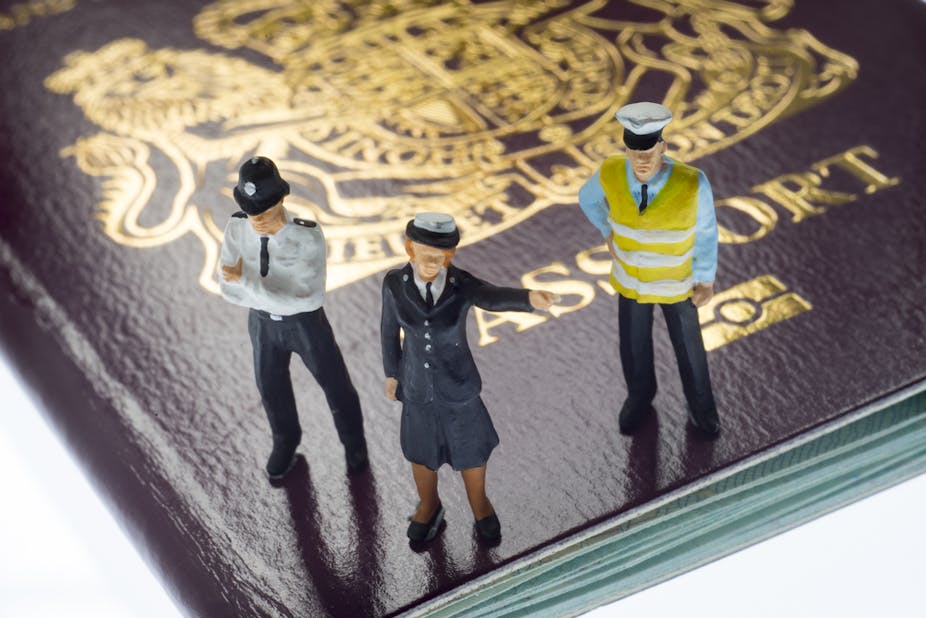There are probably over a million foreigners here illegally at the moment. There’s a large number, so no one could ever remove those really.
David Wood, former director general of immigration enforcement, Home Office, speaking to MPs on the Home Affairs Select Committee on October 10.
Details on the numbers of unauthorised people living in the UK are thin on the ground. Over ten years ago, a Home Office report estimated the population present in the UK without authorisation as between 310,000 and 570,000 – with a “central” estimate of 430,000.
A later estimate by researchers from the London School of Economics in 2009, published by the Greater London Authority, had a higher range with a potential top estimate of 719,000 and a lower one of 373,000. Its central estimate was 533,000.
On the – rather dubious – basis of drawing a rough line between these numbers over time, and projecting it onwards and upwards, you could guess that we are now nearer a range with a high estimate of around a million. But these are the maximum figures, and the lower end of the range is equally possible.
These estimates have been criticised by experts and comparisons are difficult because they use different statistical techniques and varying definitions for which population they are measuring. As the Office for National Statistics conceded in a Freedom of Information response in 2015: “The methodology behind this work requires huge assumptions thus making the estimates largely uncertain.”
Statements such as Wood’s are inflammatory because of the perception that the people he is referring to are a dangerous, criminal element within society. There have long been calls to stop using the term “illegal immigrant” because of the way it dehumanises and conflates the breaking of immigration rules with criminality.
Who is ‘illegal’?
The complexity and increasing restrictions on entry and residence in the UK mean that people can become “illegal” rather easily, and in myriad different ways. This can even be unintentional, in the case of those people born to foreign nationals with irregular status. A 2012 report by the University of Oxford’s Centre on Migration, Policy and Society estimated that 120,000 irregular migrant children live in the UK.
It is misleading to conflate these kinds of situations with those in which foreign nationals have committed serious crimes and thereby become eligible to be removed from the country. A recent BBC Panorama expose on immigration detention showed how terrible the situation can get when we treat all those that fall foul of the immigration and asylum system like criminals.
Information about those deported from the UK is a bit more readily available, but not entirely straightforward. The Migration Observatory, which recently provided a useful summary of the latest data, claims that administrative removals, forced deportations, and voluntary return of immigrants have hovered around the 40,000 a year mark since 2010.

Within this figure, total forced deportations are falling while voluntary return is increasing, perhaps reflecting success for the “hostile environment” strategy begun by Theresa May when she was home secretary. Yet the strategy of making the country an unpleasant and difficult place to live for those deemed unwanted by the state arguably has negative impacts that outweigh the benefits. For example, research into the impacts of landlord checks – designed to target irregular migration – found it leads to increases in discrimination against all other foreign nationals and those from British black and minority ethnic groups by landlords.
Verdict
Ultimately there is very little solid evidence on irregular immigration into the UK and so it would be impossible to verify Wood’s claim. The most authoritative research on different migrant populations is usually derived from ten-yearly census data. This can throw up surprising things, such as in 2001 when the census revealed there were a million fewer people living in the country than previously thought.
Review
Nando Sigona, senior lecturer and deputy director of the Institute for Research into Superdiversity, University of Birmingham
It’s hard to see a solid base for David Wood’s claim. The author of this fact check is correct in pointing out the several ifs and buts that inform such estimates. Caution is particularly important in this area due to the highly politically charged climate that surrounds the debate on undocumented migration in the UK. Wood’s claim is particularly questionable for two substantial reasons. First, it was recently revealed that the UK had vastly overestimated the number of students overstaying visas – a group assumed to make up an important segment of the undocumented population in the UK.
Second, UK borders proved to be effective in limiting unauthorised entry at the peak of the refugee and migration crisis. The number of asylum applications increased only marginally in the UK while it was booming in many EU member states, so it is fair to assume that unauthorised entrants make up only a marginal segment of the UK’s undocumented population.
The Conversation is checking claims made by public figures and prominent commentators in public debates. Statements are checked by an academic with expertise in the area. A second academic expert then reviews an anonymous copy of the article. Please get in touch if you spot a claim you would like us to check by emailing us at uk-factcheck@theconversation.com. Please include the statement you would like us to check, the date it was made, and a link if possible.

